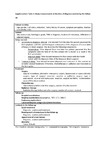Mostrar o rexistro simple do ítem
Diagnosis delay and follow-up strategies in colorectal cancer. Prognosis implications: a study protocol
| dc.contributor.author | Pita-Fernández, Salvador | |
| dc.contributor.author | Pértega-Díaz, Sonia | |
| dc.contributor.author | López-Calviño, Beatriz | |
| dc.contributor.author | González Santamaría, María Paloma | |
| dc.contributor.author | Seoane-Pillado, Teresa | |
| dc.contributor.author | Arnal-Monreal, Francisco | |
| dc.contributor.author | Maciá, Francesc | |
| dc.contributor.author | Sánchez Calavera, María Antonia | |
| dc.contributor.author | Espí, Alejandro | |
| dc.contributor.author | Valladares-Ayerbes, Manuel | |
| dc.contributor.author | Pazos, A. | |
| dc.contributor.author | Reboredo, Margarita | |
| dc.contributor.author | González-Sáez, Luis | |
| dc.contributor.author | Ramos Montserrat, María | |
| dc.contributor.author | Segura, Josep M. | |
| dc.contributor.author | Monreal Aliaga, Isabel | |
| dc.contributor.author | González-Luján, Luis | |
| dc.contributor.author | Martín-Rabadán, María | |
| dc.contributor.author | Murta Nascimento, Cristiane | |
| dc.contributor.author | Pueyo, Olga | |
| dc.contributor.author | Boscá-Watts, Marta M. | |
| dc.contributor.author | Cabeza Irigoyen, Elena | |
| dc.contributor.author | Casmitjana Abella, Montserrat | |
| dc.contributor.author | Pinilla, Marina | |
| dc.contributor.author | Costa-Alcaraz, Ana | |
| dc.contributor.author | Ruiz Torrejón, Amador | |
| dc.contributor.author | Burón Post, Andrea | |
| dc.contributor.author | García Aranda, Concepción | |
| dc.contributor.author | Lluc Bennasar, María de | |
| dc.contributor.author | Lafita, Sergio | |
| dc.contributor.author | Novella, Maite | |
| dc.contributor.author | Manzano, Hermini | |
| dc.contributor.author | Vadell, Catalina | |
| dc.contributor.author | Falcó, Esther | |
| dc.contributor.author | Esteva, Magdalena | |
| dc.date.accessioned | 2022-06-20T11:35:42Z | |
| dc.date.available | 2022-06-20T11:35:42Z | |
| dc.date.issued | 2010-10-05 | |
| dc.identifier.citation | Pita Fernández S, Pértega Díaz S, López Calviño B, González Santamaría P, Seoane Pillado T, Arnal Monreal F, Maciá F, Sánchez Calavera MA, Espí Macías A, Valladares Ayerbes M, Pazos A, Reboredo López M, González Saez L, Montserrat MR, Segura Noguera JM, Monreal Aliaga I, González Luján L, Martín Rabadán M, Murta Nascimento C, Pueyo O, Boscá Watts MM, Cabeza Irigoyen E, Casmitjana Abella M, Pinilla M, Costa Alcaraz A, Ruiz Torrejón A, Burón Pust A, García Aranda C, de Lluc Bennasar M, Lafita Mainz S, Novella M, Manzano H, Vadell C, Falcó E, Esteva M. Diagnosis delay and follow-up strategies in colorectal cancer. Prognosis implications: a study protocol. BMC Cancer. 2010 Oct 5;10:528. doi: 10.1186/1471-2407-10-528. PMID: 20920369; PMCID: PMC2958943. | es_ES |
| dc.identifier.issn | 1471-2407 | |
| dc.identifier.uri | http://hdl.handle.net/2183/30963 | |
| dc.description | Multicenter study | es_ES |
| dc.description.abstract | [Abstract] Background: Controversy exists with regard to the impact that the different components of diagnosis delay may have on the degree of invasion and prognosis in patients with colorectal cancer. The follow-up strategies after treatment also vary considerably. The aims of this study are: a) to determine if the symptoms-to-diagnosis interval and the treatment delay modify the survival of patients with colorectal cancer, and b) to determine if different follow-up strategies are associated with a higher survival rate. Methods/design: Multi-centre study with prospective follow-up in five regions in Spain (Galicia, Balearic Islands, Catalonia, Aragón and Valencia) during the period 2010-2012. Incident cases are included with anatomopathological confirmation of colorectal cancer (International Classification of Diseases 9th revision codes 153-154) that formed a part of a previous study (n = 953).At the time of diagnosis, each patient was given a structured interview. Their clinical records will be reviewed during the follow-up period in order to obtain information on the explorations and tests carried out after treatment, and the progress of these patients.Symptoms-to-diagnosis interval is defined as the time calculated from the diagnosis of cancer and the first symptoms attributed to cancer. Treatment delay is defined as the time elapsed between diagnosis and treatment. In non-metastatic patients treated with curative intention, information will be obtained during the follow-up period on consultations performed in the digestive, surgery and oncology departments, as well as the endoscopies, tumour markers and imaging procedures carried out.Local recurrence, development of metastases in the follow-up, appearance of a new tumour and mortality will be included as outcome variables.Actuarial survival analysis with Kaplan-Meier curves, Cox regression and competitive risk survival analysis will be performed. Discussion: This study will make it possible to verify if the different components of delay have an impact on survival rate in colon cancer and rectal cancer. In consequence, this multi-centre study will be able to detect the variability present in the follow-up of patients with colorectal cancer, and if this variability modifies the prognosis. Ideally, this study could determine which follow-up strategies are associated with a better prognosis in colorectal cancer. | es_ES |
| dc.language.iso | eng | es_ES |
| dc.publisher | BioMed Central | es_ES |
| dc.relation.uri | https://doi.org/10.1186/1471-2407-10-528 | es_ES |
| dc.rights | Atribución 3.0 España | es_ES |
| dc.rights.uri | http://creativecommons.org/licenses/by/3.0/es/ | * |
| dc.subject | Colorectal neoplasms | es_ES |
| dc.title | Diagnosis delay and follow-up strategies in colorectal cancer. Prognosis implications: a study protocol | es_ES |
| dc.type | journal article | es_ES |
| dc.rights.accessRights | open access | es_ES |
| UDC.journalTitle | BMC Cancer | es_ES |
| UDC.volume | 10 | es_ES |
| UDC.startPage | 528 | es_ES |
| UDC.coleccion | Investigación | es_ES |
| UDC.grupoInv | Epidemioloxía Clínica e Biotestatística (INIBIC) | es_ES |
| UDC.institutoCentro | INIBIC - Instituto de Investigacións Biomédicas de A Coruña | es_ES |
Ficheiros no ítem
Este ítem aparece na(s) seguinte(s) colección(s)
-
Investigación (FCS) [1295]






